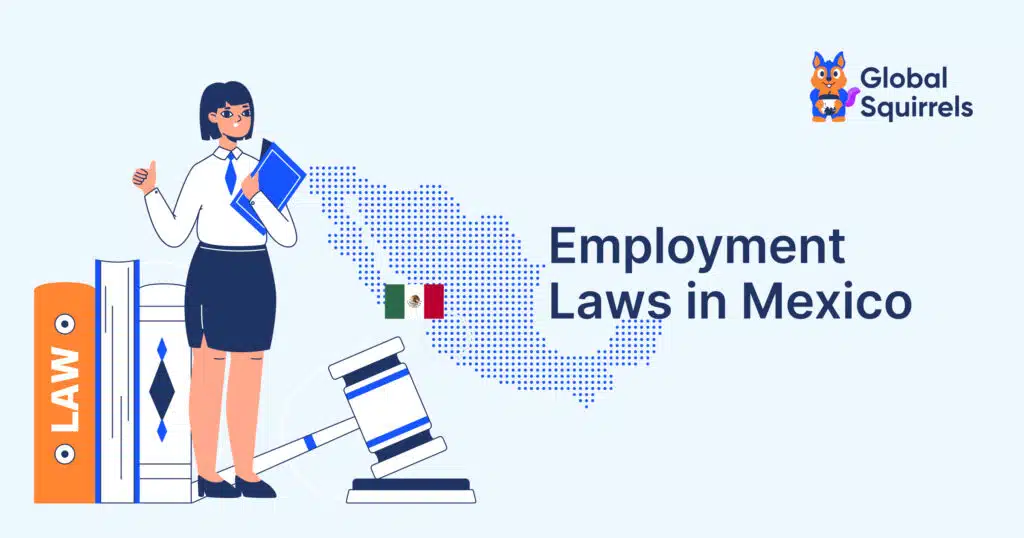Employment Laws in Mexico

Mexico has some of the most detailed and complex employment laws in Latin America. Employers must understand key regulations like payroll rules, tax structures, and leave entitlements before hiring in Mexico. This blog explains everything you need to know about employment law compliance in Mexico.
In this blog, we will discuss the employment laws in Mexico in detail.
What is the difference between employment laws and Mexico labor laws?
Employment laws in Mexico deal with individual employee rights, while labor laws focus on unions and collective bargaining, Both are regulated by different systems and apply to different workplace relationships.
| Type | Employment Laws | Mexico Labor Laws |
| Focus | Employer–Employee relationship | Employer–Union relationship |
| Regulated By | Federal Labor Law (FLL) + State Laws | Collective Bargaining Agreement (CBA) |
| Key Topics | Compensation, benefits, contracts, working hours | Union rights, collective agreements, strike rules |
| Enforcement Body | Labor courts via individual lawsuits | Unions, labor authorities, labor courts |
| Type of Agreement | Individual contracts | Collective agreements negotiated by unions |
| Applicability | All employees (whether unionized or not) | Employees represented by unions |
What are the employment laws in Mexico?
Mexico’s employment laws provide comprehensive worker protections and are distinct from their labor laws, which govern unionized workforce. Here’s a detailed look at key aspects of Mexican employment law:
Mexico payroll laws details – wage, bonus, and other benefits of employees
Under Mexico payroll laws’ details, there are wages, bonuses, minimum and maximum wages, payroll cycles, etc – all covered.
General wage
The concept of a “general wage” in Mexico is a bit complex due to the variations in minimum wage and actual salaries across different factors. Here’s a breakdown to help you understand:
What is the minimum wage in Mexico?
- Varies based on location and type of work: There are two main categories:
- General minimum wage: Currently at 207.44 pesos per workday (approximately USD 10.40).
- Not necessarily representative of the average wage: Many occupations earn significantly more than the minimum wage.
What is the Average salary in Mexico?
- Depends on various factors: Industry, experience, education, location, company size, etc.
- Recent estimates:
1. The median monthly salary is approximately 29,200 MXN (approximately USD 1,695).
2. The average annual salary is estimated at 399,000 MXN (approximately USD 23,154).
3. Cost of living varies across Mexico: Adjusting for cost of living, Mexican salaries may be comparable to some lower-income countries.
Payroll cycle
According to Mexico payroll laws, the payroll cycle is followed by-weekly. Employees receive their salary on the 15th and last day of the month.
Mexico working hours
In Mexico, the concept of “minimum working hours” isn’t straightforward due to different types of work schedules and legal aspects. Here’s a breakdown to clarify
Work shift
- Day shift: The day shift starts at 6 am and continues up to 8 pm.
- Night shift: Evening 8 pm, it starts and continues up to 6 am.
- Swing or mixed shift: This shift lasts seven-and-a-half hours, with at least three-and-a-half of those hours occurring during the night shift schedule.
Standard work week
- 48 hours total: This is the legal maximum for a standard work week.
- Divided into: Typically 6 days of 8 hours each, though schedules can vary with employer approval.
Minimum daily hours
- No legal minimum: There’s no specific minimum number of hours an employer must guarantee an employee per day or week.
Overtime
- Double pay: Any hours worked beyond the 48-hour maximum must be compensated at double the regular rate.
Part-time and temporary work
- No minimum hours: For part-time and temporary work, specific hours can be agreed upon in the contract, with no legal minimum set.
Exceptions and considerations
- Night shifts: Have shorter maximum durations (7 hours per day and 42 hours per week) due to potential health and safety concerns.
- Mixed shifts: Combining day and night work has a slightly longer maximum (7.5 hours per day and 45 hours per week).
Points to be remembered
- Flexible arrangements: While no minimum hours are mandated, employers and employees can agree on customized schedules.
- Overtime protection: Overtime pay ensures fair compensation for exceeding standard working hours.
- Contractual agreements: Always refer to the employment contract for specific hours and arrangements established between employer and employee.
What types of leave are provided under Mexico’s employment laws?
As per employment laws in Mexico, employees are entitled to several types of leave to ensure rest, manage personal needs, and fulfill essential family responsibilities. Here’s a breakdown of the key types:
Paid leaves
- Annual leave: All employees are entitled to 10 days of paid vacation leave per year, accrued proportionally throughout the year.
- Sick leave: 7 days of paid sick leave can be used per year, with an additional 6 days without pay. Doctors’ notes may be required for extended absences.
- Maternity leave: 6 months of paid leave are provided to mothers before and after childbirth.
- Paternity leave: 5 days of paid leave are granted to fathers upon the birth of their child.
- Wedding leave: Up to 5 days of paid leave can be taken for the employee’s marriage.
- Bereavement leave: 3 days of paid leave are allowed for the death of a close family member.
Unpaid leaves
- Educational leave: Employees can request unpaid leave to pursue further education, with employer approval and specific conditions.
- Personal leave: Unpaid leave can be granted for unforeseen circumstances or personal reasons upon employer approval.
Additional leaves
- Breastfeeding breaks: Mothers with newborns are entitled to two 30-minute breastfeeding breaks per workday.
- Prenatal checkups: Pregnant employees can attend prenatal checkups during working hours without loss of pay.
To learn more about how these leave policies apply in the broader context of employee rights and responsibilities in Mexico, check out this detailed guide on Employee Leave Policies in Mexico.
What are Mexico’s rules on probation and notice periods?
According to the employment laws in Mexico, probation, notice, and termination policies are different.
Probation Period in Mexico
As per Mexico labor laws, the probation period for new hires is regulated by the Federal Labor Law (FLL) and can vary depending on the type of position and its duration. As per the labor laws in Mexico, 30 days is the minimum probation period in Mexico. But in some employment cases, it lasts up to 180 days.
Notice period in Mexico
In Mexico, notice periods for employee resignation and employer termination differ, each with its own rules and regulations. Here’s a breakdown to help you understand
Employee resignation
- No legal obligation: As per the Federal Labor Law (FLL), employees are not legally bound to provide any notice period before resigning. They can typically leave the company immediately or give reasonable notice based on professional courtesy or contractual agreements.
- Exceptions: Certain contracts might stipulate a specific notice period, especially for high-ranking positions or those involving confidential information.
- Professional courtesy: While not mandatory, giving reasonable notice (e.g., two weeks) shows professionalism and allows for a smooth handover of responsibilities.
Employer termination
- Termination with cause: If an employer fires an employee for justifiable reasons (e.g., misconduct, poor performance, violating company policies), there’s no legal requirement to provide notice. However, written notification of the reason for termination is still necessary.
- Termination without cause: If an employee is terminated without justifications, the employer must provide a notice period or severance pay:
- Notice period: One month’s notice before the termination date must be given.
- Severance pay: If notice is not provided, the employer must pay separation pay (indemnización) equivalent to one month’s salary for every year of service (capped at 12 months).
Expanding your team in Mexico requires understanding the local hiring landscape. This guide hire employees in mexico provides insights into labor lawsHiring Guide for Mexico provides insights into labor laws, payroll, and best practices for compliance.
How is tax calculated in Mexico payroll?
According to payroll laws in Mexico, the tax system depends on various factors. Here is the breakdown of the tax in Mexico
- Progressive system: Tax rates increase with increasing income.
- Five brackets: Currently, the brackets range from 1.92% to 35% (as of 2023).
- Taxable income: Includes wages, salaries, bonuses, interest income, rental income, and capital gains.
- Withholding: Employers automatically withhold income tax based on salary and tax brackets.
- Annual tax return: Individuals are responsible for filing annual tax returns to calculate their total tax liability and claim any deductions or credits.
- Mandatory contributions: Paid by both employees and employers to fund social security benefits like healthcare, retirement pensions, and disability insurance.
- Contribution rate: Varies based on the employee’s salary and type of social security scheme (IMSS or SITE).
- Deducted from salary: The employer automatically deducts the employee’s contribution from salary and remits it along with the employer’s contribution to the relevant social security institution.
- Value Added Tax (VAT): A 16% tax is applied to most goods and services.
- Additional taxes: Some specific products and services may have additional taxes.
Managing payroll, taxes, and compliance in Mexico can be costly. Knowing Employer of Record costs helps evaluate if outsourcing via an EOR is more cost-effective than a local entity.
Exceptional Labor Rules in Mexico
There are some exceptional cases under the employment laws in Mexico. As Mexico labor laws come under Federal Labor Laws (FLL), a few rules are different from other countries. Here is the list of cases that are hardly found in other countries
- In general, employers do not have the right to terminate employees without viable reasons
- Employees must get severance pay if they get terminated for reasons
- Termination without reasons must be addressed with the highest severance pay
- An employee can resign anytime without serving a notice period
- Employees receive the 13th month salary as a Christmas bonus
You need to understand the services, including compliance, Mexico payroll laws, onboarding rules, and how experienced EOR service providers can simplify these processes for you.
